Peugeot 208 vs VW ID.4 – Which model is better for everyday use?
Everyday use, family trips or long-distance drives – here’s where the differences show.
Discover whether Peugeot 208 or VW ID.4 fits your lifestyle better.
Costs and Efficiency:
When it comes to price and running costs, the biggest differences usually appear. This is often where you see which car fits your budget better in the long run.
Peugeot 208 has a significantly advantage in terms of price – it starts at 20700 £, while the VW ID.4 costs 34600 £. That’s a price difference of around 13890 £.
In terms of energy consumption, the advantage goes to the Peugeot 208: with 14.10 kWh per 100 km, it’s somewhat more efficient than the VW ID.4 with 15.60 kWh. That’s a difference of about 1.50 kWh.
As for range, the VW ID.4 performs noticeable better – achieving up to 569 km, about 137 km more than the Peugeot 208.
Engine and Performance:
Power, torque and acceleration are the classic benchmarks for car enthusiasts – and here, some clear differences start to show.
When it comes to engine power, the VW ID.4 has a significantly edge – offering 340 HP compared to 156 HP. That’s roughly 184 HP more horsepower.
In acceleration from 0 to 100 km/h, the VW ID.4 is decisively quicker – completing the sprint in 5.40 s, while the Peugeot 208 takes 8.30 s. That’s about 2.90 s faster.
In terms of top speed, the Peugeot 208 performs barely noticeable better – reaching 200 km/h, while the VW ID.4 tops out at 180 km/h. The difference is around 20 km/h.
There’s also a difference in torque: VW ID.4 pulls decisively stronger with 679 Nm compared to 270 Nm. That’s about 409 Nm difference.
Space and Everyday Use:
Beyond pure performance, interior space and usability matter most in daily life. This is where you see which car is more practical and versatile.
Both vehicles offer seating for 5 people.
In curb weight, Peugeot 208 is significantly lighter – 1165 kg compared to 1975 kg. The difference is around 810 kg.
In terms of boot space, the VW ID.4 offers noticeable more room – 543 L compared to 352 L. That’s a difference of about 191 L.
In maximum load capacity, the VW ID.4 performs noticeable better – up to 1575 L, which is about 412 L more than the Peugeot 208.
When it comes to payload, VW ID.4 noticeable takes the win – 551 kg compared to 430 kg. That’s a difference of about 121 kg.
Who wins the race?
The VW ID.4 proves to be is largely superior and therefore becomes our DriveDuel Champion!
VW ID.4 is the better all-rounder in this comparison.
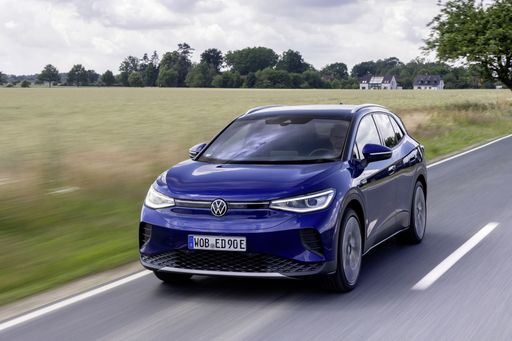
VW ID.4
Peugeot 208
The Peugeot 208 exudes a distinctive French charm, combining sleek lines with an assertive stance on the road. Inside, it offers a modern and sophisticated cabin, complete with intuitive technology and high-quality finishes to enhance the driving experience. Its agile handling and efficient performance make it a delightful choice for both city commuting and longer journeys.
details @ www.media.stellantis.com
@ www.media.stellantis.com
 @ www.media.stellantis.com
@ www.media.stellantis.com
 @ www.media.stellantis.com
@ www.media.stellantis.com
 @ www.media.stellantis.com
@ www.media.stellantis.com
VW ID.4
The VW ID.4 represents Volkswagen's commitment to the electric vehicle market, combining contemporary design with sustainability. Its spacious interior and intuitive technology make it an attractive choice for those seeking comfort and innovation in an eco-friendly package. With a focus on electric performance and practicality, this car is set to be a popular option among environmentally-conscious drivers.
details @ Volkswagen
@ Volkswagen
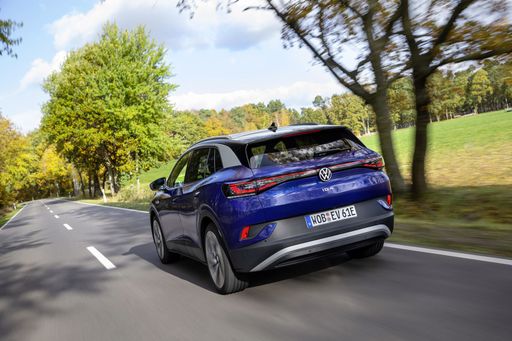 @ Volkswagen
@ Volkswagen
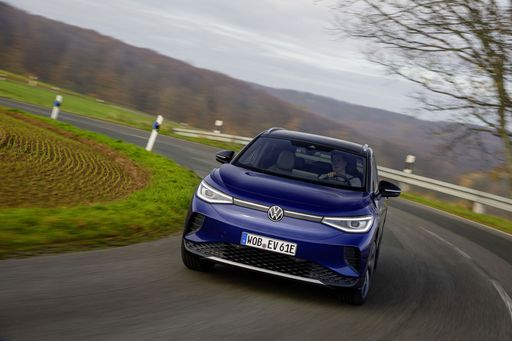 @ Volkswagen
@ Volkswagen
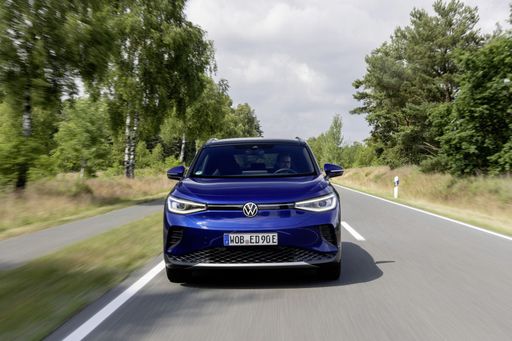 @ Volkswagen
@ Volkswagen
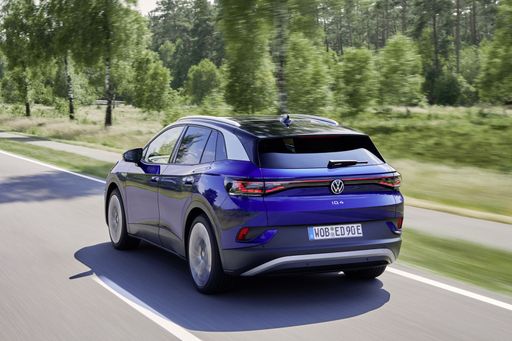 @ Volkswagen
@ Volkswagen
 @ Volkswagen
@ Volkswagen
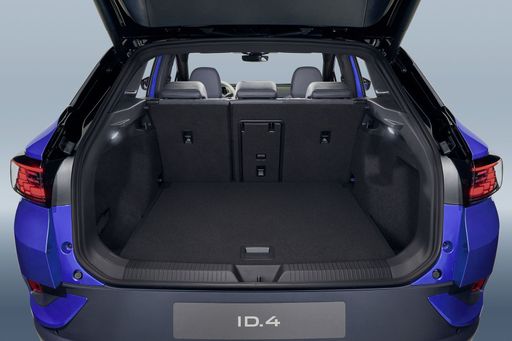 @ Volkswagen
@ Volkswagen
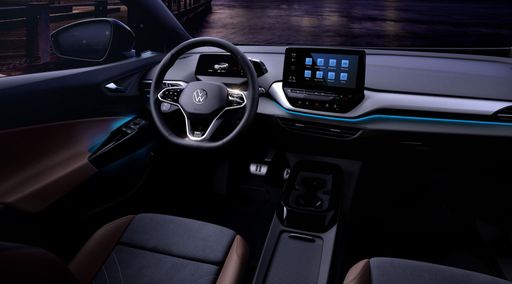 @ Volkswagen
@ Volkswagen

|

|
|
|
|
Costs and Consumption |
|
|---|---|
|
Price
20700 - 35200 £
|
Price
34600 - 47200 £
|
|
Consumption L/100km
4.5 - 5.2 L
|
Consumption L/100km
-
|
|
Consumption kWh/100km
14.1 - 15.4 kWh
|
Consumption kWh/100km
15.6 - 17 kWh
|
|
Electric Range
362 - 432 km
|
Electric Range
356 - 569 km
|
|
Battery Capacity
46 - 51 kWh
|
Battery Capacity
52 - 77 kWh
|
|
co2
0 - 117 g/km
|
co2
0 g/km
|
|
Fuel tank capacity
44 L
|
Fuel tank capacity
-
|
Dimensions and Body |
|
|---|---|
|
Body Type
Hatchback
|
Body Type
SUV
|
|
Seats
5
|
Seats
5
|
|
Doors
5
|
Doors
5
|
|
Curb weight
1165 - 1530 kg
|
Curb weight
1975 - 2248 kg
|
|
Trunk capacity
309 - 352 L
|
Trunk capacity
543 L
|
|
Length
4055 mm
|
Length
4582 - 4584 mm
|
|
Width
1745 mm
|
Width
1852 mm
|
|
Height
1430 mm
|
Height
1619 - 1634 mm
|
|
Max trunk capacity
1118 - 1163 L
|
Max trunk capacity
1575 L
|
|
Payload
380 - 430 kg
|
Payload
511 - 551 kg
|
Engine and Performance |
|
|---|---|
|
Engine Type
Petrol, Electric, Petrol MHEV
|
Engine Type
Electric
|
|
Transmission
Manuel, Automatic
|
Transmission
Automatic
|
|
Transmission Detail
Manual Gearbox, Reduction Gearbox, Dual-Clutch Automatic
|
Transmission Detail
Reduction Gearbox
|
|
Drive Type
Front-Wheel Drive
|
Drive Type
Rear-Wheel Drive, All-Wheel Drive
|
|
Power HP
101 - 156 HP
|
Power HP
170 - 340 HP
|
|
Acceleration 0-100km/h
8.3 - 10.9 s
|
Acceleration 0-100km/h
5.4 - 9 s
|
|
Max Speed
150 - 200 km/h
|
Max Speed
160 - 180 km/h
|
|
Torque
205 - 270 Nm
|
Torque
310 - 679 Nm
|
|
Number of Cylinders
3
|
Number of Cylinders
-
|
|
Power kW
74 - 115 kW
|
Power kW
125 - 250 kW
|
|
Engine capacity
1199 cm3
|
Engine capacity
-
|
General |
|
|---|---|
|
Model Year
2023 - 2025
|
Model Year
2023 - 2025
|
|
CO2 Efficiency Class
D, A, C
|
CO2 Efficiency Class
A
|
|
Brand
Peugeot
|
Brand
VW
|
What drive types are available for the Peugeot 208?
The Peugeot 208 is offered with Front-Wheel Drive.
The prices and data displayed are estimates based on German list prices and may vary by country. This information is not legally binding.
